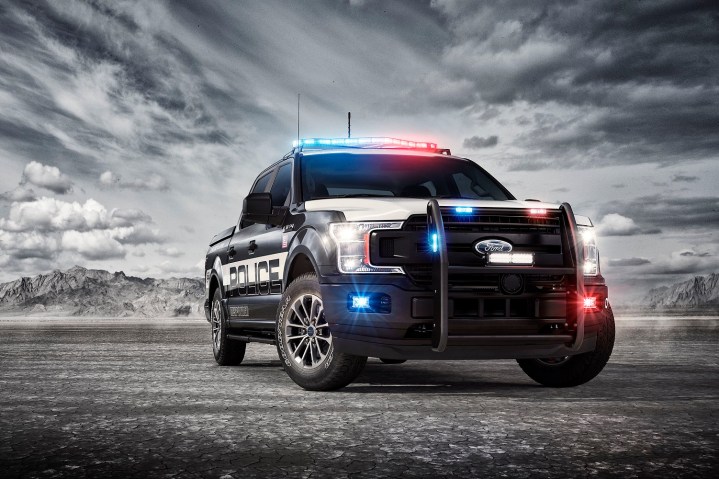
The police car of the future could outsmart speedsters, according to Ford. Filings recently submitted to the United States Patent and Trademark Office suggest the Michigan-based firm is studying ways to build a self-driving patrol car capable of enforcing the rules of the road without a human office behind the wheel.
Uncovered by Motor1, the filings explain Ford’s autonomous patrol car would primarily rely on a vehicle-to-vehicle communication system. It would establish a wireless connection with a speeding car, for example, and send a message indicating it’s going too fast. The offending vehicle would then reply by specifying whether it’s in autonomous or manual mode. If a human is driving, it would also send a copy of the driver’s license. The police car would then send a ticket or a warning; there is no word yet on how it would make the call. Good luck smooth-talking your way out of a ticket.
It all sounds like a science-fiction film, doesn’t it? It gets better (or worse, depending on your point of view). Ford adds artificial intelligence could help an autonomous police car learn the best places to hide so speeding motorists don’t see it. It could drive itself autonomously with an officer behind the wheel or go on the prowl on its own so law enforcement officials can spend time performing tasks that can’t be automated.
The patent filings (pictured above) bring up an interesting question: in which circumstance(s) can an autonomous vehicle violate a traffic law? Proponents of the technology regularly trumpet self-driving cars represent a major breakthrough because they will make our roads safer by not speeding, swerving, texting, drinking, tailgating, running lights, or crashing. The companies building them will ensure they never break the law which, in theory, eliminates the need for traffic enforcement, especially on the highway.
It’s important to note patent filings don’t guarantee the technology will reach production, let alone hit the market in a timely manner. Automakers routinely patent ideas to ensure competitors don’t steal them. Ford recently placed a sizable focus on autonomous technology, but it hasn’t commented on the nature of the filings. Law enforcement agencies will, in the foreseeable future, continue to put human officers behind the wheel.
Ford sees other applications for its autonomous technology. In addition to virtually pulling you over, Robocop-style, the company wants its self-driving cars to take you to work and deliver the next pizza you order from Domino’s. It has already deployed an experimental pizza delivery car based on the Ford Fusion Hybrid in the Ann Arbor, Michigan, area.
Editors' Recommendations
- Dubai Police to deploy driverless patrol cars with AI smarts
- Waymo’s self-driving cars can’t get enough of one dead-end street
- Ford reveals the vehicle destined for its autonomous-car services
- Ford releases self-driving car data to encourage further research
- Ford delays the launch of its robocar services by a year






